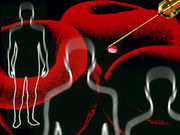Donors and recipients don’t need to be a perfect match, researcher says
THURSDAY, Sept. 8, 2016 (HealthDay News) — Umbilical cord blood may work as well as current alternatives for adults and children with leukemia — or even better in some cases, according to a study published in the Sept. 8 issue of the New England Journal of Medicine.
To compare the success of the different options, researchers looked at 582 patients with leukemia or myelodysplastic syndrome. If a compatible bone marrow or stem cell transplant from an unrelated donor wasn’t available, the patients received either a cord-blood transplant or an incompatible bone marrow or stem cell transplant from an unrelated donor.
“Our study showed that overall survival after cord-blood transplantation was comparable to the one observed after matched unrelated transplants,” lead author Filippo Milano, M.D., Ph.D., of the Fred Hutchinson Cancer Research Center in Seattle, told HealthDay. And patients who got cord-blood transplants seemed to live longer than those who got non-matching bone marrow or stem cell transplants from unrelated donors, he noted. The cord blood approach appeared especially beneficial for a subset of patients with minimal residual disease.
“Often, cord-blood transplant is thought to be only as the last resource for patients without donors. But cord blood does not have to be considered only an alternative donor source,” Milano said. “In centers with experience, it can yield to great outcomes.”
Copyright © 2016 HealthDay. All rights reserved.








